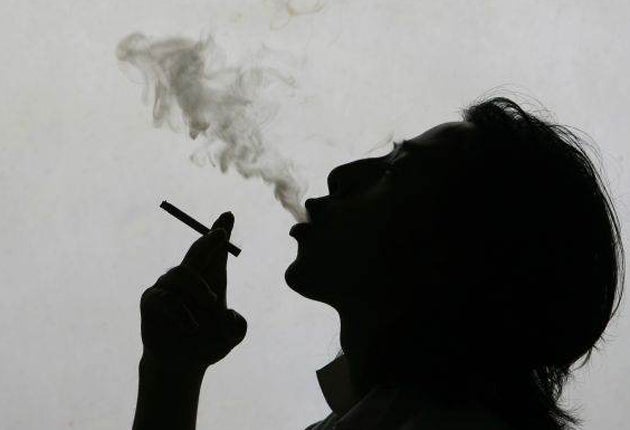Passive smoking 'causes 1 per cent of all world's deaths'

Your support helps us to tell the story
From reproductive rights to climate change to Big Tech, The Independent is on the ground when the story is developing. Whether it's investigating the financials of Elon Musk's pro-Trump PAC or producing our latest documentary, 'The A Word', which shines a light on the American women fighting for reproductive rights, we know how important it is to parse out the facts from the messaging.
At such a critical moment in US history, we need reporters on the ground. Your donation allows us to keep sending journalists to speak to both sides of the story.
The Independent is trusted by Americans across the entire political spectrum. And unlike many other quality news outlets, we choose not to lock Americans out of our reporting and analysis with paywalls. We believe quality journalism should be available to everyone, paid for by those who can afford it.
Your support makes all the difference.Breathing other people's tobacco smoke is the cause of one in every 100 deaths worldwide, but is a risk over which its victims have no control, researchers have announced.
Demanding tougher restrictions on smoking, the World Health Organisation (WHO) in Geneva says the toll is heaviest on women and children who account for three-quarters of the 600,000 global deaths a year.
In the UK, almost 3,800 deaths a year are attributable to passive smoking and, given that enclosed public smoking is banned, most of these will have been as a result of exposure to smoking at home.
There are more than one billion smokers in the world who expose billions more to their smoke. Of the 192 countries in the world only 17 have laws banning public smoking, despite evidence showing they cut exposure to second-hand smoke by 60 per cent.
The harm done by passive smoking has been known for decades but it is only in the last 10 years that the scale of the damage – and ways to prevent it – have become clear. Controversy has surrounded the issue because of the disproportionate risks of passive smoking. A non-smoker who lives with a person who smokes 20 cigarettes a day has third of the risk to health of their partner, even though they are actually exposed to only 1 per cent of the smoke, equivalent to one cigarette every five days.
The scale of the risk has met with disbelief and scientists have struggled to convey why it is so high. Evidence shows that the effect on the blood of toxins in tobacco smoke peaks at low levels of exposure. The toxins increase the stickiness of the blood (the tendency of the platelets to aggregate) and inflame the arteries, increasing the risk of thrombosis, a blood clot forming that that triggers a heart attack.
Heart problems thus increase rapidly for people exposed to low levels of smoke, such as those experienced in passive smoking. This is mirrored by the experience of light smokers, among whom the heart risks rise rapidly for those who smoke one to five cigarettes a day but then rise more slowly as smoking increases to 20 cigarettes a day. At that level, the long term risks of lung cancer rise. The authors of the study found exposure to second-hand smoke varied from 13 per cent of the population in Africa to 50 per cent or more in eastern Europe and the Western pacific. They based their estimates on national surveys and laboratory studies such as measure of hair nicotine content carried out in 31 countries on three continents.
The results showed that passive smoking is the cause of 165,000 deaths a year among children from respiratory diseases and 379,000 deaths among adults from heart disease. Lung cancer, the biggest cause of death among smokers, accounts for just 21,000 deaths among passive smokers.
Most deaths among children occurred in developing countries but in adults deaths were spread across all regions of the world. The figures are based on data from 2004, the latest year for which it could be obtained for all 192 countries.
The beneficial effects of banning smoking are felt quickly because it rapidly reduces the number of heart attacks caused by "sticky" blood.
The biggest impact is in the first year, with accompanying reductions in the costs of illness which "ought to make it attractive to policymakers," the authors say.
Passive smoking is not as deadly as smoking, which claims 5.1m deaths a year. Smoking, however, is avoidable.
Join our commenting forum
Join thought-provoking conversations, follow other Independent readers and see their replies
Comments